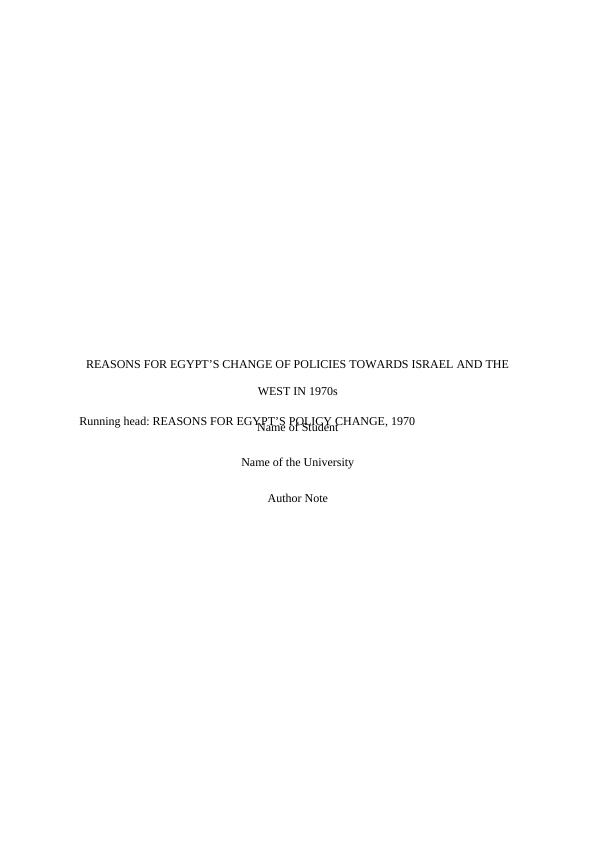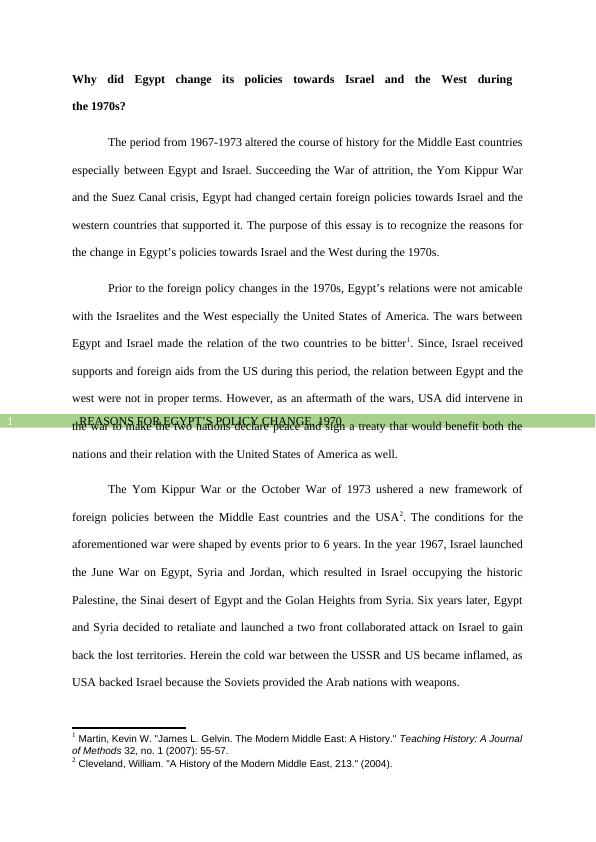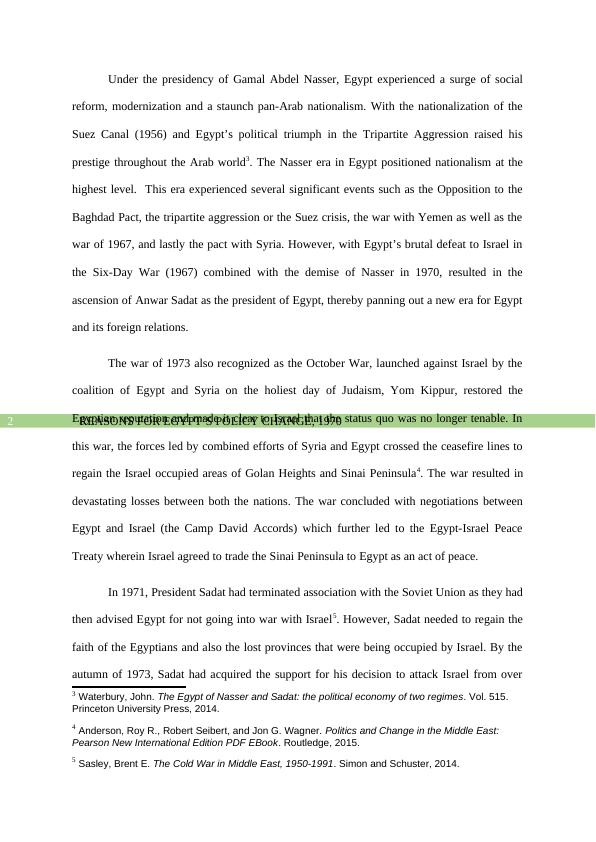Reasons for Egypt's Policy Change, 1970
6 Pages1302 Words364 Views
Added on 2022-10-12
About This Document
This essay explores the reasons for Egypt's policy change towards Israel and the West during the 1970s, including the Yom Kippur War and the Camp David Accords. It also discusses the impact of the change on Egypt's foreign relations with the USA and Israel.
Reasons for Egypt's Policy Change, 1970
Added on 2022-10-12
ShareRelated Documents
Running head: REASONS FOR EGYPT’S POLICY CHANGE, 1970
REASONS FOR EGYPT’S CHANGE OF POLICIES TOWARDS ISRAEL AND THE
WEST IN 1970s
Name of Student
Name of the University
Author Note
REASONS FOR EGYPT’S CHANGE OF POLICIES TOWARDS ISRAEL AND THE
WEST IN 1970s
Name of Student
Name of the University
Author Note

REASONS FOR EGYPT’S POLICY CHANGE, 19701
Why did Egypt change its policies towards Israel and the West during
the 1970s?
The period from 1967-1973 altered the course of history for the Middle East countries
especially between Egypt and Israel. Succeeding the War of attrition, the Yom Kippur War
and the Suez Canal crisis, Egypt had changed certain foreign policies towards Israel and the
western countries that supported it. The purpose of this essay is to recognize the reasons for
the change in Egypt’s policies towards Israel and the West during the 1970s.
Prior to the foreign policy changes in the 1970s, Egypt’s relations were not amicable
with the Israelites and the West especially the United States of America. The wars between
Egypt and Israel made the relation of the two countries to be bitter1. Since, Israel received
supports and foreign aids from the US during this period, the relation between Egypt and the
west were not in proper terms. However, as an aftermath of the wars, USA did intervene in
the war to make the two nations declare peace and sign a treaty that would benefit both the
nations and their relation with the United States of America as well.
The Yom Kippur War or the October War of 1973 ushered a new framework of
foreign policies between the Middle East countries and the USA2. The conditions for the
aforementioned war were shaped by events prior to 6 years. In the year 1967, Israel launched
the June War on Egypt, Syria and Jordan, which resulted in Israel occupying the historic
Palestine, the Sinai desert of Egypt and the Golan Heights from Syria. Six years later, Egypt
and Syria decided to retaliate and launched a two front collaborated attack on Israel to gain
back the lost territories. Herein the cold war between the USSR and US became inflamed, as
USA backed Israel because the Soviets provided the Arab nations with weapons.
1 Martin, Kevin W. "James L. Gelvin. The Modern Middle East: A History." Teaching History: A Journal
of Methods 32, no. 1 (2007): 55-57.
2 Cleveland, William. "A History of the Modern Middle East, 213." (2004).
Why did Egypt change its policies towards Israel and the West during
the 1970s?
The period from 1967-1973 altered the course of history for the Middle East countries
especially between Egypt and Israel. Succeeding the War of attrition, the Yom Kippur War
and the Suez Canal crisis, Egypt had changed certain foreign policies towards Israel and the
western countries that supported it. The purpose of this essay is to recognize the reasons for
the change in Egypt’s policies towards Israel and the West during the 1970s.
Prior to the foreign policy changes in the 1970s, Egypt’s relations were not amicable
with the Israelites and the West especially the United States of America. The wars between
Egypt and Israel made the relation of the two countries to be bitter1. Since, Israel received
supports and foreign aids from the US during this period, the relation between Egypt and the
west were not in proper terms. However, as an aftermath of the wars, USA did intervene in
the war to make the two nations declare peace and sign a treaty that would benefit both the
nations and their relation with the United States of America as well.
The Yom Kippur War or the October War of 1973 ushered a new framework of
foreign policies between the Middle East countries and the USA2. The conditions for the
aforementioned war were shaped by events prior to 6 years. In the year 1967, Israel launched
the June War on Egypt, Syria and Jordan, which resulted in Israel occupying the historic
Palestine, the Sinai desert of Egypt and the Golan Heights from Syria. Six years later, Egypt
and Syria decided to retaliate and launched a two front collaborated attack on Israel to gain
back the lost territories. Herein the cold war between the USSR and US became inflamed, as
USA backed Israel because the Soviets provided the Arab nations with weapons.
1 Martin, Kevin W. "James L. Gelvin. The Modern Middle East: A History." Teaching History: A Journal
of Methods 32, no. 1 (2007): 55-57.
2 Cleveland, William. "A History of the Modern Middle East, 213." (2004).

REASONS FOR EGYPT’S POLICY CHANGE, 19702
Under the presidency of Gamal Abdel Nasser, Egypt experienced a surge of social
reform, modernization and a staunch pan-Arab nationalism. With the nationalization of the
Suez Canal (1956) and Egypt’s political triumph in the Tripartite Aggression raised his
prestige throughout the Arab world3. The Nasser era in Egypt positioned nationalism at the
highest level. This era experienced several significant events such as the Opposition to the
Baghdad Pact, the tripartite aggression or the Suez crisis, the war with Yemen as well as the
war of 1967, and lastly the pact with Syria. However, with Egypt’s brutal defeat to Israel in
the Six-Day War (1967) combined with the demise of Nasser in 1970, resulted in the
ascension of Anwar Sadat as the president of Egypt, thereby panning out a new era for Egypt
and its foreign relations.
The war of 1973 also recognized as the October War, launched against Israel by the
coalition of Egypt and Syria on the holiest day of Judaism, Yom Kippur, restored the
Egyptian reputation and made it clear to Israel that the status quo was no longer tenable. In
this war, the forces led by combined efforts of Syria and Egypt crossed the ceasefire lines to
regain the Israel occupied areas of Golan Heights and Sinai Peninsula4. The war resulted in
devastating losses between both the nations. The war concluded with negotiations between
Egypt and Israel (the Camp David Accords) which further led to the Egypt-Israel Peace
Treaty wherein Israel agreed to trade the Sinai Peninsula to Egypt as an act of peace.
In 1971, President Sadat had terminated association with the Soviet Union as they had
then advised Egypt for not going into war with Israel5. However, Sadat needed to regain the
faith of the Egyptians and also the lost provinces that were being occupied by Israel. By the
autumn of 1973, Sadat had acquired the support for his decision to attack Israel from over
3 Waterbury, John. The Egypt of Nasser and Sadat: the political economy of two regimes. Vol. 515.
Princeton University Press, 2014.
4 Anderson, Roy R., Robert Seibert, and Jon G. Wagner. Politics and Change in the Middle East:
Pearson New International Edition PDF EBook. Routledge, 2015.
5 Sasley, Brent E. The Cold War in Middle East, 1950-1991. Simon and Schuster, 2014.
Under the presidency of Gamal Abdel Nasser, Egypt experienced a surge of social
reform, modernization and a staunch pan-Arab nationalism. With the nationalization of the
Suez Canal (1956) and Egypt’s political triumph in the Tripartite Aggression raised his
prestige throughout the Arab world3. The Nasser era in Egypt positioned nationalism at the
highest level. This era experienced several significant events such as the Opposition to the
Baghdad Pact, the tripartite aggression or the Suez crisis, the war with Yemen as well as the
war of 1967, and lastly the pact with Syria. However, with Egypt’s brutal defeat to Israel in
the Six-Day War (1967) combined with the demise of Nasser in 1970, resulted in the
ascension of Anwar Sadat as the president of Egypt, thereby panning out a new era for Egypt
and its foreign relations.
The war of 1973 also recognized as the October War, launched against Israel by the
coalition of Egypt and Syria on the holiest day of Judaism, Yom Kippur, restored the
Egyptian reputation and made it clear to Israel that the status quo was no longer tenable. In
this war, the forces led by combined efforts of Syria and Egypt crossed the ceasefire lines to
regain the Israel occupied areas of Golan Heights and Sinai Peninsula4. The war resulted in
devastating losses between both the nations. The war concluded with negotiations between
Egypt and Israel (the Camp David Accords) which further led to the Egypt-Israel Peace
Treaty wherein Israel agreed to trade the Sinai Peninsula to Egypt as an act of peace.
In 1971, President Sadat had terminated association with the Soviet Union as they had
then advised Egypt for not going into war with Israel5. However, Sadat needed to regain the
faith of the Egyptians and also the lost provinces that were being occupied by Israel. By the
autumn of 1973, Sadat had acquired the support for his decision to attack Israel from over
3 Waterbury, John. The Egypt of Nasser and Sadat: the political economy of two regimes. Vol. 515.
Princeton University Press, 2014.
4 Anderson, Roy R., Robert Seibert, and Jon G. Wagner. Politics and Change in the Middle East:
Pearson New International Edition PDF EBook. Routledge, 2015.
5 Sasley, Brent E. The Cold War in Middle East, 1950-1991. Simon and Schuster, 2014.

End of preview
Want to access all the pages? Upload your documents or become a member.
Related Documents
Sample Assignment on Politics PDFlg...
|4
|778
|49
Economics Assignment Economic Eventslg...
|9
|3053
|42
DST1DEV - Globalisation And Developmentlg...
|11
|2518
|89
